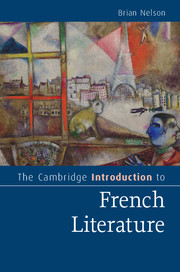Book contents
- Frontmatter
- Dedication
- Contents
- Preface
- Acknowledgements
- Chronology
- 1 Villon: a dying man
- 2 Rabelais: the uses of laughter
- 3 Montaigne: self-portrait
- 4 Corneille: heroes and kings
- 5 Racine: in the labyrinth
- 6 Molière: new forms of comedy
- 7 La Fontaine: the power of fables/fables of power
- 8 Madame de Lafayette: the birth of the modern novel
- 9 Voltaire: the case for tolerance
- 10 Rousseau: man of feeling
- 11 Diderot: the enlightened sceptic
- 12 Laclos: dangerous liaisons
- 13 Stendhal: the pursuit of happiness
- 14 Balzac: ‘All is true’
- 15 Hugo: the divine stenographer
- 16 Baudelaire: the streets of Paris
- 17 Flaubert: the narrator vanishes
- 18 Zola: the poetry of the real
- 19 Huysmans: against nature
- 20 Mallarmé: the magic of words
- 21 Rimbaud: somebody else
- 22 Proust: the self, time and art
- 23 Jarry: the art of provocation
- 24 Apollinaire: impresario of the new
- 25 Breton … Company: Surrealism
- 26 Céline: night journey
- 27 Sartre: writing in the world
- 28 Camus: a moral voice
- 29 Beckett: filling the silence
- 30 French literature into the twenty-first century
- Notes
- Further reading
- Index of authors and titles
- Index of genres, movements and concepts
- Cambridge Introductions to …
- References
6 - Molière: new forms of comedy
Published online by Cambridge University Press: 05 July 2015
- Frontmatter
- Dedication
- Contents
- Preface
- Acknowledgements
- Chronology
- 1 Villon: a dying man
- 2 Rabelais: the uses of laughter
- 3 Montaigne: self-portrait
- 4 Corneille: heroes and kings
- 5 Racine: in the labyrinth
- 6 Molière: new forms of comedy
- 7 La Fontaine: the power of fables/fables of power
- 8 Madame de Lafayette: the birth of the modern novel
- 9 Voltaire: the case for tolerance
- 10 Rousseau: man of feeling
- 11 Diderot: the enlightened sceptic
- 12 Laclos: dangerous liaisons
- 13 Stendhal: the pursuit of happiness
- 14 Balzac: ‘All is true’
- 15 Hugo: the divine stenographer
- 16 Baudelaire: the streets of Paris
- 17 Flaubert: the narrator vanishes
- 18 Zola: the poetry of the real
- 19 Huysmans: against nature
- 20 Mallarmé: the magic of words
- 21 Rimbaud: somebody else
- 22 Proust: the self, time and art
- 23 Jarry: the art of provocation
- 24 Apollinaire: impresario of the new
- 25 Breton … Company: Surrealism
- 26 Céline: night journey
- 27 Sartre: writing in the world
- 28 Camus: a moral voice
- 29 Beckett: filling the silence
- 30 French literature into the twenty-first century
- Notes
- Further reading
- Index of authors and titles
- Index of genres, movements and concepts
- Cambridge Introductions to …
- References
Summary
Making the gentry laugh is a strange business.
– Molière, The School for Wives CriticizedMolière (1622–73) is universally recognized as France's greatest comic playwright. He was also, by all accounts, the finest comic actor of his generation. He himself performed the leading roles in his plays, and at the same time was a director and manager: a complete man of the theatre. To focus on his plays as written texts, and to ignore questions of performance and stagecraft, would obscure our appreciation of his dramatic virtuosity, his specifically theatrical achievements and the remarkable variety of his work. Moreover, he was a highly self-conscious artist whose work constitutes a reflection, in the context of his times, on the nature and possibilities of comic drama. His achievement, as writer-actor-manager, was to renew comic drama in France and to give it something of the status of tragedy.
Comedy high and low
Born Jean-Baptiste Poquelin, in Paris, Molière enjoyed a comfortable bourgeois upbringing. His father was a prosperous tapissier (upholsterer and tapestryweaver) attached to the court of Louis XIII. He could have pursued a profitable career in his father's trade or in the law; however, he chose to abandon his studies in 1643 to become an actor, and this at a time when actors were often categorized on official documents with prostitutes and highwaymen and the Church taught that theatres were places of perdition. With Joseph and Madeleine Béjart, among others, Molière founded the Illustre Théâatre. But it went bankrupt in under two years, and the troupe was obliged to leave Paris. They toured the provinces for the next thirteen years, providing private performances for wealthy noblemen in their chateaux and public performances in the towns of southern France. It was during this period that Molière received the theatrical training that provided him with the basis for his later success in Paris.
- Type
- Chapter
- Information
- The Cambridge Introduction to French Literature , pp. 39 - 46Publisher: Cambridge University PressPrint publication year: 2015

